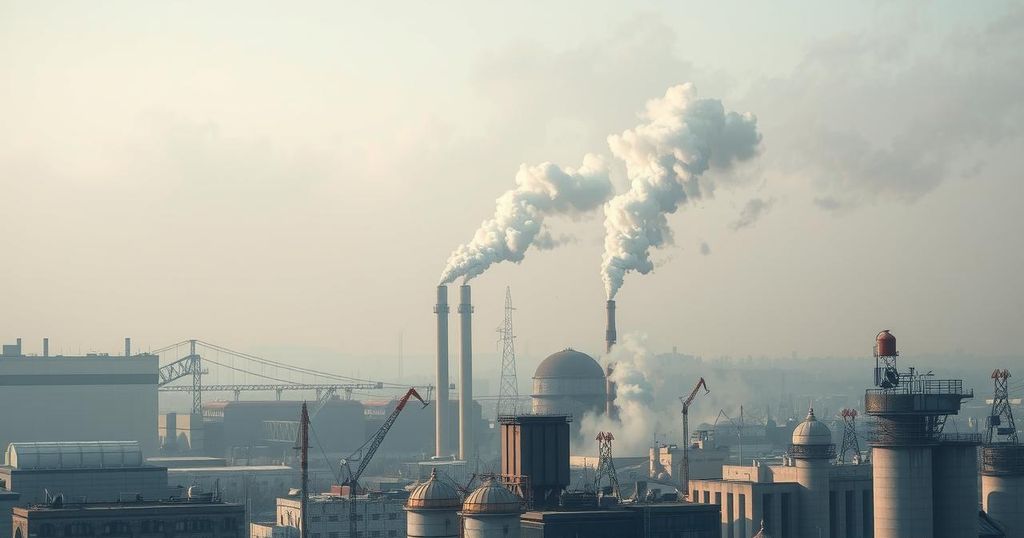Pakistan has been ranked the third most polluted country in 2024 as per IQAir’s report. The country experienced unprecedented smog levels, particularly in Punjab, impacting public health severely. Chad leads the rankings, followed by Bangladesh. Despite some pollution level decreases in cities like Karachi, the overall situation remains critical, necessitating urgent environmental action.
On Tuesday, the Swiss air technology company IQAir released its annual report indicating that Pakistan ranked as the third most polluted country in the world for 2024, experiencing a notably severe smog season. Chad secured the top position, followed by Bangladesh in the second spot. Last year, Pakistan faced unprecedented smog levels, particularly in Punjab, leading the government to declare a calamity and approximately two million individuals sought medical treatment for related health problems.
The IQAir 2024 World Air Quality Report noted that the average concentration of PM2.5 particles in Pakistan stood at 73.7 micrograms per cubic metre (μg/m³), which is nearly 15 times greater than the World Health Organization’s (WHO) safe limit. Interestingly, Pakistan’s average pollution remained consistent with the previous year, despite the record-smog conditions. In the Central and South Asia region, Pakistan ranked second, just behind Bangladesh, with cities like Lahore, Multan, Peshawar, and Sialkot appearing among the 15 most polluted cities in the region.
According to the report, “Pakistan faces persistently high levels of pollution from various sources, including biomass burning, industrial activities, vehicular emissions, brick kilns, and construction dust.” Comparatively, cities such as Peshawar, Islamabad, Rawalpindi, and Lahore saw increases in their annual average pollution levels, while Faisalabad’s pollution levels remained relatively unchanged. Conversely, Karachi experienced a decrease in PM2.5 levels from over 55 μg/m³ in 2023 to approximately 46 μg/m³ in 2024.
The report also indicated that in November, five cities in Pakistan recorded pollution levels exceeding 200 μg/m³. This report was constructed from data collected from over 40,000 air quality monitoring stations across 138 countries. It was additionally noted that around 70% of the population in Pakistan is affected by health issues related to smog, as per an Ipsos report.
The IQAir report further detailed that Chad registered air quality readings 18 times higher than WHO’s safe levels, while India recorded readings approximately 10 times the recommended limits. Despite a decline in pollution levels in 2024, India still hosts six of the world’s nine most polluted cities, with Byrnihat, an industrial town, noted as the most polluted metropolitan area globally in 2024. New Delhi was identified as the world’s most polluted capital, followed closely by Chad’s N’Djamena.
Byrnihat had an alarming PM2.5 reading of 128.2 μg/m³, which is more than 25 times the WHO standard. The report indicated that the overall pollution levels across India are significantly impacted by vehicular emissions, agricultural burning, and industrial waste, although there was a seven percent reduction from the previous year. Additionally, the report highlighted that South Asia’s pollution typically escalates during the winter months.
Oceania was identified as the cleanest region globally, with 57% of cities meeting the WHO PM2.5 annual guideline value. In Europe, Bosnia was reported as the most polluted country, with levels exceeding the WHO limit by more than five times, followed by North Macedonia and Serbia. Data from Burkina Faso, Iran, and Afghanistan were not included in the report due to a lack of sufficient data.
Conversely, only seven countries reported pollution concentrations below WHO guidelines, including Estonia, Iceland, and New Zealand. The report also indicated an improvement where 17% of the studied cities met WHO standards in 2024, a notable increase from only 9% in 2023. Worldwide, air pollution remains a significant environmental health risk, contributing to 8.1 million premature deaths in 2021 according to estimates from the Health Effects Institute.
The IQAir 2024 report showcases the alarming state of air quality in Pakistan and several other countries, highlighting the severe health implications of pollution. Pakistan, as the third most polluted country, faces considerable challenges in managing pollution levels, with actions taken by the government evidencing the urgent need for effective environmental policies. Improvements have been noted in certain regions, but persistent high pollution levels continue to affect public health significantly.
Original Source: www.dawn.com






